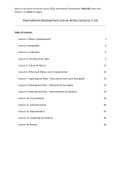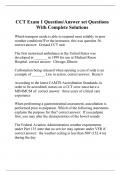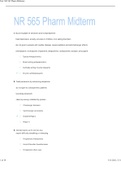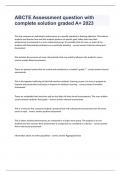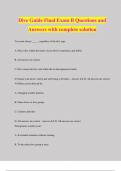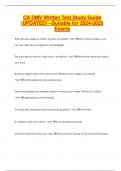lectures 1-14 (Total: 44 pages).
International Development Lecture Notes (Lectures 1-14)
Table of Contents
Lecture 1: What is Development? 1
Lecture 2: Geography 4
Lecture 3: Institutions 6
Lecture 4: The Role of the State 9
Lecture 5: Culture & History 13
Lecture 6: Why Good Policies aren’t Implemented 16
Lecture 7: Importing the Rules - Does aid do more harm than good? 19
Lecture 8: Breaking the Rules - Clientelism & Corruption 22
Lecture 9: Resisting the Rules - Vested Interests & Identities 24
Lecture 10: Accountability 28
Lecture 11: Collective Action 30
Lecture 12: Representation 33
Lecture 13: Leadership & Coalitions 36
Lecture 14: Review 39
, 1
Lecture 1: What is Development?
1. Introduction
Politics: How public decisions are made (“who gets what, when, how” Lasswell).
2. What is development?
Development = many definitions, NO consensus.
Modernisation Theory: Progress in society is about a single, linear transition (top-down) from the
same “traditions start to the same ‘modern’ end” (correlation/cluster of changes).
➔ Increasing GDP per capita, education, urbanisation (“all good things change together”).
Subjective Development: Bottom-up perspective that is culturally specific (‘voices of the poor’).
Development is perceived & valued differently in varying societies (necessary for survival vs. savings
for additional means).
➔ ‘Freedoms’ let people choose what they value.
➔ E.g., “what one shouldn’t lack is the sheep, what one cannot live without is food grain”
(China).
Development as Freedom (Sen, 1992)
Freedom = respects different cultures/people’s choices that can still be used to measure/compare across
other societies as well.
Freedom to do what? What limits freedom?
1. Participate in politics. ● Poverty, lack of opportunities,
2. Engage in economic transactions. state restrictions, etc..
3. Social opportunities through education & healthcare.
4. Transparency during interactions.
5. Security of life.
Why freedom?
1. Intrinsic reason = freedom matters in itself.
2. Instrumental reason = freedoms help promote/achieve other freedoms (e.g., democracy prevents
famine, BUT also matters for political freedom in itself).
Development is about Complementarities, NOT trade-offs (= modernisation theory). BUT ‘freedoms’ let
people choose what they value (= subjective development):
1. NOT just ‘freedom from’ interference = libertarianism, negative freedom (what I can do, where NO
one can stop me).
➔ BUT Freedom as Capabilities = opportunities, positive freedom (what I can achieve).
◆ E.g., the capability to live a long life.
2. NOT just about income (NOT all ends can be bought), needs vary = resources are converted into
capabilities.
3. NOT about what people do with their Freedoms/Capabilities (people choose specific
functionings).
, 2
How do we choose which Capabilities/Freedoms matter?
● For Sen, this is what democracy is for, BUT Sen still proposes 5 Freedoms.
○ How do we ‘choose’ for countries under authoritarianism?
● NOT normative question → politics is the conflict between people who value different dimensions
of development.
● Different development aspects matter differently to each of us (everyone is faced with different
circumstances/needs).
Sustainable Development: Development that meets the present’s needs without compromising the
ability of future generations to meet their own needs.
➔ Strong sustainability = natural capital
does NOT fall.
➔ Weak sustainability = sum of natural +
physical (produced & human) capital
does NOT fall.
◆ Since the physical > natural
capital = “sustainable”.
➔ Are continued economic growth & environmental sustainability compatible?
◆ ‘Development’ route to sustainability:
● Rapid technological innovation will help
us solve problems like climate change.
● Wealth & education reduce fertility,
reducing environmental pressures
(Kuznets curve).
● HOWEVER, this depends on the pressures.
◆ ‘Sustainability’ route to development:
● Tackling environmental challenges will stimulate new innovations &
investments.
● Conserving assets improves their productivity.
● Avoiding climate stresses prevents conflict & boosts yields.
➔ The question is: who is it sustainable for?
The Development Dictionary (Sachs, 2010)
Post-development critiques:
, 3
1. ‘Development’ discourse = harmful → creates a Western as developed hierarchy & the rest as
‘underdeveloped’.
➔ “Poverty is a myth, a construct & the invention of a particular Western civilisation.”
➔ Rejects modernisation theory = we are NOT travelling in the same direction (more is NOT
always better).
2. ‘Development’ is an imposition of power & hierarchy (Cold War & post-colonialism ‘weapon’).
➔ Development as ‘planned/managed poverty’ = a top-down, ethnocentric, technocratic
approach resulting in Westernisation & eradication of diversity.
3. ‘Development’ has failed on its terms (rising inequality, delusions, failures, have been steady
companions of development).
4. ‘Development’ is an industry of self-interested actors (governments, NGOs, BINGOs, for-profit
companies, Foundations), reliant on the continuation of poverty (government contracts, markets).
3. How do we measure development?
Measurement challenges:
● Development = multidimensional, frequent.
● Lack of data collection capacity in the countries that matter the most.
● Representative data on the most vulnerable is challenging.
● Hard to attribute progress to specific policies when many things change at the same time.
Methods:
1. Human Development Index (HDI): Balances education, health, income indicators equally,
but measures them individually.
2. Multidimensional Poverty Index (MPI): % of
people who are poor in ⅓ of the indicators.
Looks at the data for poverty distribution at
an individual level.


